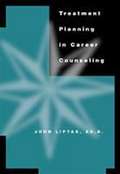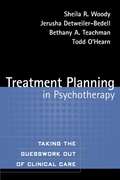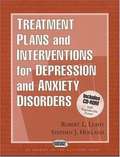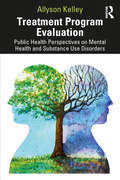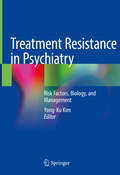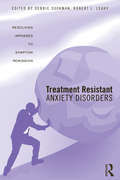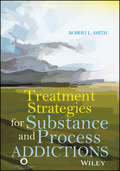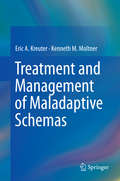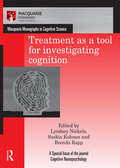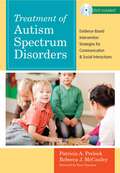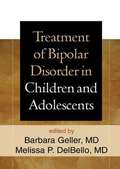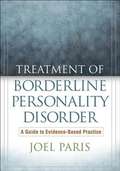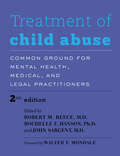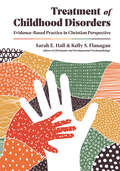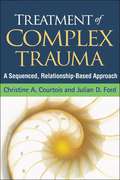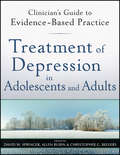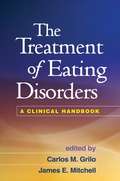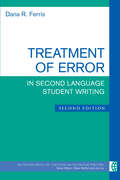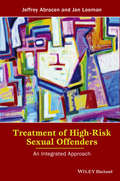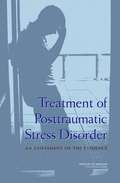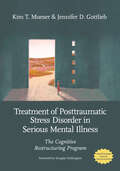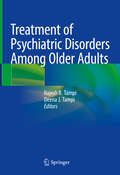- Table View
- List View
Treatment Planning in Career Counseling
by John J. LiptakThis process-oriented, how-to, and clinically oriented text is the book that the market has been waiting for. Ideal for both beginning and experienced career counselors, the text reviews the most influential career development theories and illustrates how to use them in developing treatment plans. The author provides a practical focus on how to most effectively and competently use these theories in practice, leaving the comprehensive overview and in-depth discussion of theories for other career counseling texts.
Treatment Planning in Psychotherapy
by Sheila R. Woody Jerusha Detweiler-BedellThis user-friendly book helps clinicians of any theoretical orientation meet the challenges of evidence-based practice. Presented are tools and strategies for setting clear goals in therapy and tracking progress over the course of treatment, independent of the specific interventions used. A wealth of case examples illustrate how systematic treatment planning can enhance the accountability and efficiency of clinical work and make reporting tasks easier without taking up too much time. Special features include flowcharts to guide decision making, sample assessment tools, sources for a variety of additional measures, and instructions for graphing client progress. Ideal for busy professionals, the book is also an invaluable text for graduate-level courses and clinical practica.
Treatment Plans and Interventions for Depression and Anxiety Disorders
by Robert L. Leahy Stephen J. HollandThis book is a unique and practical clinician's toolbox and includes bibliographical references and index. This book pulls together all the pieces a clinician needs to do effective therapy for seven of the most common disorders and integrates symptoms, theory, interventions, patient education, and data collection so well for so many diagnoses.
Treatment Program Evaluation: Public Health Perspectives on Mental Health and Substance Use Disorders
by Allyson KelleyThis invaluable text provides a rigorous guide to the assessment and evaluation of treatment programs through a multi-disciplinary, holistic model of care. It highlights issues of race, social justice, and health equity, and offers real-world guidance to effect community healing and transformation. Written by a researcher and experienced evaluator, the book begins by outlining the theories and research which frame our understanding of substance misuse, and upon which treatment programs are based. It then examines the principles which should underpin any evaluation, before detailing the practical various steps required to conduct an evaluation, from data collection to outcome measurement. The book shows, too, through detailed and effective evaluation, policy changes can be made and treatment programs improved. Including practical examples of evaluation and assessment throughout, and also assessing the numerous social systems which can support recovery, the book builds to a four-step public health model for establishing sustainable treatment programs. In an era where substance misuse has reached epidemic proportions in the United States and beyond, this book will be essential reading for anyone involved in public health policy and practice in this important area.
Treatment Resistance in Psychiatry: Risk Factors, Biology, And Management
by Yong-Ku KimThis book reviews all the important aspects of treatment-resistant psychiatric disorders, covering issues such as definitions, clinical aspects, neurobiological correlates, treatment options, and predictors of treatment response. The book is divided into three sections, the first of which examines the most recent thinking on treatment resistance in psychiatry, including definition and epidemiology, paradigm shift in the study of the subjects, individual susceptibility and resilience, abnormal structural or functional connectivity, and insights from animal models. The second section then discusses treatment resistance in each of the major psychiatric disorders, with particular focus on the responsible clinical and biological factors and the available management strategies. Finally, more detailed information is presented on diverse pharmacological and non-pharmacological therapeutic interventions. The book, written by leading experts from across the world, will be of value to all who seek a better understanding of the clinical-neurobiological underpinnings and the development of management for treatment resistance in psychiatric disorders.
Treatment Resistant Anxiety Disorders: Resolving Impasses to Symptom Remission
by Debbie SookmanTreatment Resistant Anxiety Disorders: Resolving Impasses to Symptom Remission brings together leading cognitive behavioral therapists from major theoretical orientations to provide clinicians with a greatly needed source of information, skills, and strategies from a wide range of CBT approaches. It describes how to combine empirically-based findings, broad based and disorder specific theoretical models, and individualized case conceptualization to formulate and apply specific strategies for varied aspects of resistance during treatment of anxiety disorders.
Treatment Strategies for Substance Abuse and Process Addictions
by Robert L. SmithThis distinctive and timely text examines the most prevalent substance and process addictions and focuses on current research and evidence-based treatment strategies. Major substance addictions discussed include alcohol, tobacco, marijuana, methamphetamines, and prescription drugs. Complete chapters are also devoted to the most frequently cited process addictions, making this text unique. Behavioral addictions covered in this text include pathological gambling, sex disorders, disordered eating, work, exercise, shopping, and Internet/gaming. Each chapter contains a listing of student learning outcomes, a case study with reflective questions, techniques for assessment and diagnosis, inpatient and outpatient treatment approaches, and resources for further study. With its emphasis on treatment strategies, this text can be used by practitioners as well as by professors in the classroom in introductory courses in addictions or in subsequent courses that focus on treatment strategies. *Requests for digital versions from the ACA can be found on wiley.com. *To request print copies, please visit the ACA website here. *Reproduction requests for material from books published by ACA should be directed to permissions@counseling.org.
Treatment and Management of Maladaptive Schemas
by Eric A. Kreuter Kenneth M. MoltnerThis volume explores new ground in the area of personal transformation, achieved partly through a person's volition with a guide or catalyst. The authors research and define the dynamics of paradigmatic-thinking, incorporating a series of case vignettes of personal transitions. They describe impediments to such change, as well as the post-transformation state of mind where vulnerabilities may persist. The resultant need for on going commitment may include guidance or coaching in order to sustain the positive effect of a change in paradigm. An important feature of the book is a case study written by "Rex," a participant in Dr. Kreuter's earlier work. Rex has achieved significant change in his thought process, both in how he sees the world (less sinister) and his self-perspective (worthy and connected). An in-depth view of the "new" Rex shows the extent to which change has been possible in one human being. Combined with other evidence of shifting paradigms drawn from a cross-section of therapeutic practice, the authors connect the clinical data with their own developed philosophy on the subject of human behavior and the ability to change with the assistance of a therapist guide to effectuate and sustain such change.
Treatment as a tool for investigating cognition (Macquarie Monographs in Cognitive Science)
by Lyndsey Nickels, Saskia Kohnen and Brenda RappCognitive neuropsychological research studies of people with cognitive deficits have typically been directed either at investigating methods of intervention, or at furthering our understanding of normal and impaired cognition. This book reports on research that combines these goals, using studies that use intervention as a ‘tool’ for investigating hypotheses about the functioning of the human cognitive system. The introductory chapter discusses some of the unique and more general difficulties that this approach faces, while the five reports describe intervention studies with children and adults with cognitive impairments – studies which investigate current theories of cognition. The studies demonstrate that the use of intervention to study cognition is a promising and valuable methodology. Aiming to promote wider use of these combined methods, this book makes it clear that while the approach faces various methodological and interpretative challenges, it has the advantage of providing advances on issues of theory while, at the same time providing treatment to participants, and bringing together what have been largely separate research traditions. This book was originally published as a special issue of Cognitive Neuropsychology.
Treatment for Posttraumatic Stress Disorder in Military and Veteran Populations
by Committee on the Assessment of Ongoing Effects in the Treatment of Posttraumatic Stress DisorderPrior to the military conflicts in Iraq and Afghanistan, wars and conflicts have been characterized by such injuries as infectious diseases and catastrophic gunshot wounds. However, the signature injuries sustained by United States military personnel in these most recent conflicts are blast wounds and the psychiatric consequences to combat, particularly posttraumatic stress disorder (PTSD), which affects an estimated 13 to 20 percent of U. S. service members who have fought in Iraq or Afghanistan since 2001. PTSD is triggered by a specific traumatic event - including combat - which leads to symptoms such as persistent re-experiencing of the event; emotional numbing or avoidance of thoughts, feelings, conversations, or places associated with the trauma; and hyperarousal, such as exaggerated startle responses or difficulty concentrating. As the U. S. reduces its military involvement in the Middle East, the Departments of Defense (DoD) and Veterans Affairs (VA) anticipate that increasing numbers of returning veterans will need PTSD services. As a result, Congress asked the DoD, in consultation with the VA, to sponsor an IOM study to assess both departments' PTSD treatment programs and services. Treatment for Posttraumatic Stress Disorder in Military and Veteran Populations: Initial Assessment is the first of two mandated reports examines some of the available programs to prevent, diagnose, treat, and rehabilitate those who have PTSD and encourages further research that can help to improve PTSD care.
Treatment of Autism Spectrum Disorders: Evidence-Based Intervention Strategies for Communication and Social Interactions
by Patricia A. Prelock Rebecca J. MccauleyThe authors aim to make the research and clinical literature on ASD (Autism Spectrum Disorders), accessible to a wide range of audiences -- parents and families of children with ASDs, frontline professionals and students, and professors who study ASDs.
Treatment of Bipolar Disorder in Children and Adolescents
by Melissa Delbello Barbara GellerRecent advances in evidence-based treatment of pediatric bipolar disorder are comprehensively reviewed in this authoritative volume. The prominent editors and contributors examine the current status of widely used medications and psychosocial therapies, and explore new horizons in tailoring treatment to individuals' neurobiological and clinical profiles. Chapters on specific populations discuss strategies for addressing common co-occurring disorders in children and adolescents with bipolar disorder, treating preschoolers, targeting depressive symptoms, and improving early intervention and prevention. Other essential topics include medication side effects and approaches to monitoring and ameliorating them, and ethical issues related to treatment and research.
Treatment of Borderline Personality Disorder
by Joel Paris Alexander ChapmanNormal0falsefalsefalseMicrosoftInternetExplorer4Organizing a vast body of scientific literature, this indispensable book presents the state of the art in understanding borderline personality disorder (BPD) and distills key treatment principles that therapists need to know. Rather than advocating a particular approach, Joel Paris examines a range of therapies and identifies the core ingredients of effective intervention. He offers specific guidance for meeting the needs of this challenging population, including ways to improve diagnosis, promote emotion regulation and impulse control, maintain appropriate therapeutic boundaries, and deal with suicidality and other crises. Highly readable, practical, and humane, the book also explains the latest thinking on the causes of BPD and how it develops.
Treatment of Child Abuse: Common Ground for Mental Health, Medical, and Legal Practitioners
by Robert M. Reece Rochelle F. Hanson John SargentAn essential, evidence-based reference book for mental health professionals and medical personnel working with victims of child abuse.Acclaimed as a milestone resource by the Journal of Child and Family Studies, Treatment of Child Abuse has been updated and expanded with ten completely new chapters. The second edition adds the expertise of co-editors Rochelle F. Hanson, Ph.D., and John Sargent, M.D., along with chapters from many new contributors.The second edition is organized by various modes of therapy, different settings for therapies, and the individualized needs of victims correlating to types of abuse and neglect. The contributors describe evidence-based and evidence-supported treatments for traumatized children and adolescents, information on research and theory underlying the interventions, and explanations of treatment protocols. The contributors focus particular attention on special populations and cultural differences. Entire sections focus on medical care and legal interventions necessary for abused youth. New and expanded material includes information on• Bullying• Sanctuary Model of trauma-informed care• Long-term medical management• Appropriate use of psychopharmacology• Importance of self-care for professionalsTreatment of Child Abuse is an important resource for mental health professionals, family physicians, pediatricians, emergency department physicians, physician assistants, and nurses, as well as child advocate professionals, social workers, and lawyers.
Treatment of Childhood Disorders: Evidence-Based Practice in Christian Perspective (Christian Association for Psychological Studies Books)
by Kelly S. Flanagan Sarah E. HallCaring for the mental health of children and their families is complex and challenging—and meaningful. For Christian clinicians who work with childhood disorders, however, few resources exist to address such treatment from a research-based Christian integration perspective. Treatment of Childhood Disorders fills this gap by combining biblical and theological understanding with current psychological literature on empirically supported treatments for children. Sarah E. Hall and Kelly S. Flanagan present an integrated approach based in developmental psychopathology, which offers a dynamic, multifaceted framework from which to understand the processes that affect children's development. In this unique textbook, Hall and Flanagan consider a variety of disorders commonly diagnosed in children and adolescents, including anxiety, depression, ADHD, and autism spectrum disorder. After discussing prevalence, risk and causal factors, patterns throughout development, and assessment, they focus on evidence-based practices that have been found to be effective in treating the disorders. Each chapter also features ideas for Christian integration in treatment and an extended case study that brings the content to life.
Treatment of Complex Trauma
by Julian D. Ford Christine A. CourtoisThis insightful guide provides a pragmatic roadmap for treating adult survivors of complex psychological trauma. Christine Courtois and Julian Ford present their effective, research-based approach for helping clients move through three clearly defined phases of posttraumatic recovery. Two detailed case examples run throughout the book, illustrating how to plan and implement strengths-based interventions that use a secure therapeutic alliance as a catalyst for change. Essential topics include managing crises, treating severe affect dysregulation and dissociation, and dealing with the emotional impact of this type of work. The companion Web page offers downloadable reflection questions for clinicians and extensive listings of professional and self-help resources. See also Drs. Courtois and Ford's edited volume, Treating Complex Traumatic Stress Disorders, which presents research on the nature of complex trauma and reviews a range of evidence-based treatment models for adults.
Treatment of Complex Trauma
by Julian D. Ford Christine A. Courtois John BriereThis insightful guide provides a pragmatic roadmap for treating adult survivors of complex psychological trauma. Christine Courtois and Julian Ford present their effective, research-based approach for helping clients move through three clearly defined phases of posttraumatic recovery. Two detailed case examples run throughout the book, illustrating how to plan and implement strengths-based interventions that use a secure therapeutic alliance as a catalyst for change. Essential topics include managing crises, treating severe affect dysregulation and dissociation, and therapist self-care. The companion website offers downloadable reflection questions for clinicians and extensive listings of professional and self-help resources. A new preface in the paperback and e-book editions addresses key scientific advances. See also Drs. Courtois and Ford's edited volumes, Treating Complex Traumatic Stress Disorders (Adults) and Treating Complex Traumatic Stress Disorders in Children and Adolescents, which present research on the nature of complex trauma and review evidence-based treatment models. Winner (Second Place)--American Journal of Nursing Book of the Year Award, Psychiatric and Mental Health Nursing Category
Treatment of Depression in Adolescents and Adults
by Allen Rubin David W. Springer Christopher G. BeeversEvidence-based interventions for treating depression in adolescents and adults Part of the Clinician's Guide to Evidence-Based Practice Series, Treatment of Depression in Adolescents and Adults provides busy mental health practitioners with detailed, step-by-step guidance for implementing clinical interventions that are supported by the latest scientific evidence. This thorough, yet practical volume draws on a roster of experts and researchers in the field who have assembled state-of-the-art knowledge into this well-rounded guide. Each chapter serves as a practitioner-focused how-to reference and covers interventions that have the best empirical support for the treatment of depression, including: Cognitive Behavior Therapy Behavioral Activation Cognitive Behavioral Analysis System of Psychotherapy for Chronic Depression Easy to use and accessible in tone, Treatment of Depression in Adolescents and Adults is indispensable for practitioners who would like to implement evidence-based, culturally competent, effective interventions in their care of clients struggling with depression.
Treatment of Eating Disorders
by James Mitchell Carlos GriloEminently practical and authoritative, this comprehensive clinical handbook brings together leading international experts on eating disorders to describe the most effective treatments and how to implement them. Coverage encompasses psychosocial, family-based, medical, and nutritional therapies for anorexia nervosa, bulimia nervosa, binge-eating disorder, and other eating disorders and disturbances. Especially noteworthy are "mini-manuals" that present the nuts and bolts of 11 of the treatment approaches, complete with reproducible handouts and forms. The volume also provides an overview of assessment, treatment planning, and medical management issues. Special topics include psychiatric comorbidities, involuntary treatment, support for caregivers, childhood eating disorders, and new directions in treatment research and evaluation.
Treatment of Error in Second Language Student Writing, Second Edition
by Ferris Dana R.Treatment of Error offers a realistic, well-reasoned account of what teachers of multilingual writers need to know about error and how to put what they know to use. As in the first edition, Ferris again persuasively addresses the fundamental error treatment questions that plague novice and expert writing specialists alike: What types of errors should teachers respond to? When should we respond to them? What are the most efficacious ways of responding to them? And ultimately, what role should error treatment play in the teaching of the process of writing? The second edition improves upon the first by exploring changes in the field since 2002, such as the growing diversity in what is called L2 writers, the blurring boundaries between native and non-native speakers of English, the influence of genre studies and corpus linguistics on the teaching of writing, and the need the move beyond error to second language development in terms of approaching students and their texts. It also explores what teacher preparation programs need to do to train teachers to treat student error. The second edition features * an updating of the literature in all chapters * a new chapter on academic language development * a postscript on how to integrate error treatment/language development suggestions in Chapters 4-6 into a writing class syllabus * the addition of discussion/analysis questions at the end of each chapter, plus suggested readings, to make the book more useful in pedagogy or teacher development workshops"
Treatment of High-Risk Sexual Offenders
by Jeffrey Abracen Jan LoomanTreatment of High-Risk Sexual Offenders addresses concrete management strategies, from initial intake to community treatment programs, and describes a detailed program for high risk offenders which has been developed, tested and refined for over 15 years. Provides a thorough review of contemporary theory and research relating to complex, challenging populations, and translates it into a comprehensive system of assessment and treatment for high risk sexual offenders Offers detailed coverage of setting and staff requirements, the importance of the therapeutic alliance, and how to balance individual therapy with group components in order to develop social and self-management skills Builds on the principle of integrative care, drawing on the established Risk-Need-Responsivity (RNR) model for offender assessment and rehabilitation but adding new components of CBT and motivational interviewing Includes a complete assessment battery and strategies for managing serious mental illness and comorbidity
Treatment of Post-traumatic Stress Disorder: An Assessment of the Evidence
by Institute of Medicine Committee on Treatment of Posttraumatic Stress Disorder StaffMental disorders, including posttraumatic stress disorder (PTSD), constitute an important health care need of veterans, especially those recently separated from service. Treatment of Posttraumatic Stress Disorder: An Assessment of the Evidence takes a systematic look the efficacy of pharmacologic and psychological treatment modalities for PTSD on behalf of the Department of Veterans Affairs. By reviewing existing studies in order to draw conclusions about the strength of evidence on several types of treatment, the Committee on the Treatment of Posttraumatic Stress Disorder found that many of these studies were faulty in design and performance, and that relatively few of these studies have been conducted in populations of veterans, despite suggestions that civilian and veteran populations respond differently to various types of treatment. The committee also notes that the evidence is scarce on the acceptability, efficacy, or generalizability of treatment in ethnic and cultural minorities, as few studies stratified results by ethnic background. Despite challenges in the consistency, quality, and depth of research, the committee found the evidence sufficient to conclude the efficacy of exposure therapies in treating PTSD. The committee found the evidence inadequate to determine efficacy of different types of pharmacotherapies, of three different psychotherapy modalities, and of psychotherapy delivered in group formats. The committee also made eight critical recommendations, some in response to the VA's questions related to recovery and the length and timing of PTSD treatment, and others addressing research methodology, gaps in evidence and funding issues.
Treatment of Posttraumatic Stress Disorder in Serious Mental Illness: The Cognitive Restructuring Program
by Kim T. Mueser Jennifer D GottliebThis book is a practical guide to the evidence-based Cognitive Restructuring (CR) for PTSD program, which has been specifically designed to meet the unique needs of people with serious mental illness. Posttraumatic stress disorder (PTSD) is very common among persons with serious mental illness (SMI). Unfortunately, it often leads to more severe psychiatric symptoms, greater impairment in psychosocial functioning, poorer physical health, and a higher use of acute care services among people with SMI. Yet despite major advances in the treatment of PTSD in the general population, PTSD has remained underdiagnosed and underaddressed among people with SMI, and treatments for this population have been relatively neglected. This practical, hands-on guide gives clinicians the tools they need for screening, detecting, and treating PTSD in their clients with SMI, including schizophrenia, bipolar disorder, major depression, and borderline personality disorder. Chapters summarize research and theory regarding the interaction between PTSD and SMI, provide nuts and bolts strategies for implementing the authors' Cognitive Restructuring for PTSD program, and offer guidance for overcoming clinical challenges to trauma treatment such as psychotic symptoms, low distress tolerance, emotion dysregulation, hopelessness, and cognitive impairment. Chapters also feature in-session dialogues with case vignettes that follow three unique clients as they participate in the CR for PTSD program. Handouts and worksheets for delivering the CR for PTSA program are available in the Appendix of the book as well as in printable versions online (https://www.apa.org/pubs/books/treatment-posttraumatic-stress-disorder-serious-mental-illness) under the Resources tab. These online resources also include the educational handouts and worksheets translated into Spanish, a supplemental chapter on The BREATHE Program: A Brief PTSD Intervention for Persons with SMI in Special Settings, and the BREATHE Treatment Program Manual.
Treatment of Posttraumatic Stress Disorder in Serious Mental Illness: The Cognitive Restructuring Program
by Kim T. Mueser Jennifer D GottliebThis book is a practical guide to the evidence-based Cognitive Restructuring (CR) for PTSD program, which has been specifically designed to meet the unique needs of people with serious mental illness. Posttraumatic stress disorder (PTSD) is very common among persons with serious mental illness (SMI). Unfortunately, it often leads to more severe psychiatric symptoms, greater impairment in psychosocial functioning, poorer physical health, and a higher use of acute care services among people with SMI. Yet despite major advances in the treatment of PTSD in the general population, PTSD has remained underdiagnosed and underaddressed among people with SMI, and treatments for this population have been relatively neglected. This practical, hands-on guide gives clinicians the tools they need for screening, detecting, and treating PTSD in their clients with SMI, including schizophrenia, bipolar disorder, major depression, and borderline personality disorder. Chapters summarize research and theory regarding the interaction between PTSD and SMI, provide nuts and bolts strategies for implementing the authors' Cognitive Restructuring for PTSD program, and offer guidance for overcoming clinical challenges to trauma treatment such as psychotic symptoms, low distress tolerance, emotion dysregulation, hopelessness, and cognitive impairment. Chapters also feature in-session dialogues with case vignettes that follow three unique clients as they participate in the CR for PTSD program. Handouts and worksheets for delivering the CR for PTSA program are available in the Appendix of the book as well as in printable versions online (https://www.apa.org/pubs/books/treatment-posttraumatic-stress-disorder-serious-mental-illness) under the Resources tab. These online resources also include the educational handouts and worksheets translated into Spanish, a supplemental chapter on The BREATHE Program: A Brief PTSD Intervention for Persons with SMI in Special Settings, and the BREATHE Treatment Program Manual.
Treatment of Psychiatric Disorders Among Older Adults
by Rajesh R. Tampi Deena J. TampiThis timely book provides detailed information regarding the latest treatment for psychiatric disorders among the growing population of older adults. The World Health Organization reports that between 2015 and 2050, the proportion of the world's older adults (≥ 60 years) will double from about 12% to almost 22% of the total population, and it is estimated that approximately 20% of older adults have a diagnosable psychiatric disorder. Many of these older adults are prescribed psychotropic medications, but these treatments can result in significant functional decline, cognitive decline, cerebrovascular adverse events, and death. The editors, in collaboration with fellow experts in geriatric psychiatry, provide the scientific background regarding the treatment of a range of psychiatric disorders among older adults. The volume features a comprehensive table of contents covering a range of psychiatry subtopics, such as neurocognitive disorders, depressive disorders, substance use disorders, and anxiety disorders. Each chapter adheres to the same easy-to-follow format, and amongst other information, includes evidence-based assessments, non-pharmacological and pharmacological therapies, potential side-effects and their treatments, and evidence-based treatment algorithms for each disorder. Treatment of Psychiatric Disorders Among Older Adults will be a valuable resource for psychiatrists, geriatricians, students, neurologists, advance practice nurses, psychologists, social workers, occupational therapists, physical therapists, and dieticians who care for older adults with mental health disorders.
